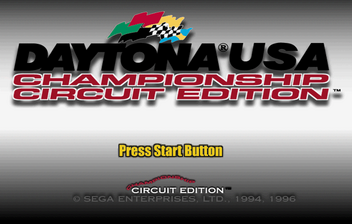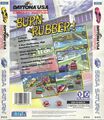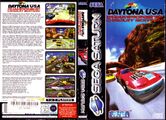Difference between revisions of "Daytona USA: Championship Circuit Edition"
From Sega Retro
m (Text replace - " \[\[Category:(Saturn Games|1994 Saturn Games|1995 Saturn Games|1996 Saturn Games|1997 Saturn Games|1998 Saturn Games|1999 Saturn Games|2000 Saturn Games|Saturn Action Games|Saturn Adventure Games|Saturn Fighting Games|Saturn Game Compilat) |
|||
| Line 114: | Line 114: | ||
{{DaytonaUSA}} | {{DaytonaUSA}} | ||
| − | |||
| − | |||
| − | |||
| − | |||
| − | |||
Revision as of 14:31, 7 June 2012
| Daytona USA: Championship Circuit Edition | |||||
|---|---|---|---|---|---|
| System(s): Sega Saturn | |||||
| Publisher: Sega | |||||
| Developer: Sega AM2, Sega AM3 | |||||
| Genre: Racing | |||||
| Number of players: 1-2 | |||||
| |||||
Daytona USA: Championship Circuit Edition is an update to the critically acclaimed Daytona USA and was released exclusively on the Sega Saturn in 1996.
Daytona USA: CCE exists because many were dissatisfied with the original game's Saturn release, which is said to have been rushed to market in order to meet the Saturn's launch date. Daytona USA on the Sega Saturn was plagued with draw distance and framerate problems (averaging about twenty frames per second, as opposed to the arcade version's sixty), and looked comparatively worse than the PlayStation port of Ridge Racer, released around the same time (and the arcade Ridge Racer is less impressive on a technical level than the arcade Daytona USA.
CCE was handled by Sega AM3, who had previously been responsible for bringing the Saturn Sega Rally Championship. They brought a number of new features to the table as well as retaining all those found in the original release. Daytona USA: Championship Circuit Edition includes a steady framerate of 30FPS, a new selection of cars, two new courses, a two player mode and a new remixed soundtrack composed by Richard Jacques and Jun Senoue. The PAL region version was also notable for making use of the full PAL resolution, rather than resorting to black borders like many other games of the time.
Like the original, the game is also compatible with the Arcade Racer Joystick, and this time 3D Control Pad support was intentional. It is also compatible with the Virtua Stick.
There was a separate release of the game in North America, made to be compatible with the Sega NetLink adapter called Daytona USA: CCE Netlink Edition. This version of the game was only made available via Sega's online store, and aside from some extra NetLink instruction manuals/leaflets, is mostly indistinguishable from its non-NetLink counterpart. This version of the game is widely believed to be the rarest North American Sega Saturn game, with the latest eBay sighting reaching $1100.
Daytona USA: CCE was not released in Japan. However, the Japanese did receive Daytona USA: Circuit Edition a year later, a further update to the game which includes the original soundtracks as an option. Circuit Edition also has new drift mechanics and allows the user to set the time of day in which to race in, whether that be night, dusk or morning.
Additions
Daytona USA: Championship Circuit Edition adds two new tracks - "National Park Speedway" (an easy track) and "Desert City" (a hard track).
It also includes several new types of stock car, some of which could be seen in the arcade version of Daytona USA but were not playable:
- Hornet (19)
- Gallop (27)
- Max (2)
- Pheonix (8)
- Orlole (16)
- Magic (33)
- Wolf (41)
- Balance (99)
This breaks the Daytona USA tradition which always gives the first car (usually the Hornet) the number 41. Every car is slightly different in design when compared to their arcade counterparts - the Hornet for example has a thinner blue stripe across the top. They also all have varying grip, acceleration and handling statistics.
AM3 decided to improve the physics of Daytona USA: CCE, creating something more akin to their previous port of Sega Rally Championship (e.g. the car won't flip if it crashes head first into a wall anymore). The majority of bizarre features from the original version carry through, such as the ability to unlock a horse. Holding ![]() and
and ![]() at the "gentlemen start your engines" screen will allow the player to play as a hovercraft.
at the "gentlemen start your engines" screen will allow the player to play as a hovercraft.
Production Credits
Producer: Noriyoshi Ohba
Director: Ryuichi Hattori
Project Leader: Shiro Kinemura
Main Programmer: Akihito Wada
Programmers: Toru Nakagawa, Atsutoshi Takahashi, Noriyuki Takano, Susumu Ise
Main Graphic Designer: Shiro Kinemura
Graphic Designers: Yoshihito Takahashi, Makiko Suzuki, Maiko Kitagawa, Sanae Tatsuo, Takehiko Akabane
Planner: Osamu Ohashi
Sound Director: Tomonori Sawada
Sound Effects: Tatsuya Kozaki
Sound Programmer: Atsumu Miyazawa
Vocal:
- Vocals for "Sons of Angels" and "The American Dream" performed by Eric Martin.
- Lyrics for "Sons of Angels" and "The American Dream" written by Eric Martin and Andre Pessis.
- Eric Martin appears courtesy of Atlantic Recording Corporation
Music & Remix: Jun Senoue, Richard Jacques, Kenichi Tokoi, Tomonori Sawada
Advisers: Toshihiro Nagoshi, Atsuhiko Nakamura
Physical Scans
| Sega Retro Average | |||||||||||||||||||||||||||||||||||||||||||||||||||||||||||||||||||||||||||||||||||||||||||||||||||||||||||||||||||||||||||||||||
|---|---|---|---|---|---|---|---|---|---|---|---|---|---|---|---|---|---|---|---|---|---|---|---|---|---|---|---|---|---|---|---|---|---|---|---|---|---|---|---|---|---|---|---|---|---|---|---|---|---|---|---|---|---|---|---|---|---|---|---|---|---|---|---|---|---|---|---|---|---|---|---|---|---|---|---|---|---|---|---|---|---|---|---|---|---|---|---|---|---|---|---|---|---|---|---|---|---|---|---|---|---|---|---|---|---|---|---|---|---|---|---|---|---|---|---|---|---|---|---|---|---|---|---|---|---|---|---|---|---|
|
| 82 | |
|---|---|
| Based on 25 reviews | |
- ↑ 576 KByte, "December 1996" (HU; 1996-xx-xx), page 18
- ↑ Ação Games, "Fevereiro 1997" (BR; 1997-xx-xx), page 31
- ↑ Ação Games, "Maio 1997" (BR; 1997-xx-xx), page 18
- ↑ Computer & Video Games, "December 1996" (UK; 1996-11-xx), page 68
- ↑ Edge, "Christmas 1996" (UK; 1996-11-22), page 82
- ↑ Fun Generation, "12/96" (DE; 1996-11-13), page 97
- ↑ GameFan, "Volume 5, Issue 1: January 1997" (US; 199x-xx-xx), page 20
- ↑ GamePro, "February 1997" (US; 1997-xx-xx), page 92
- ↑ Game Informer, "January 1997" (US; 199x-xx-xx), page 45
- ↑ Hobby Consolas, "Diciembre 1996" (ES; 199x-xx-xx), page 100
- ↑ Intelligent Gamer, "January 1997" (US; 1996-xx-xx), page 57
- ↑ Joypad, "Décembre 1996" (FR; 1996-1x-xx), page 110
- ↑ Kiber Zona, "1/1998" (LT; 1998-xx-xx), page 33
- ↑ MAN!AC, "12/96" (DE; 1996-11-13), page 80
- ↑ Mega Fun, "12/96" (DE; 1996-11-20), page 88
- ↑ Mean Machines Sega, "December 1996" (UK; 1996-11-01), page 14
- ↑ Player One, "Décembre 1996" (FR; 1996-xx-xx), page 135
- ↑ Saturn+, "Issue 5" (UK; 1996-12-19), page 7
- ↑ Secret Service, "Luty 1997" (PL; 1997-xx-xx), page 68
- ↑ Sega Power, "Christmas 1996" (UK; 1996-11-21), page 34
- ↑ Sega Saturn Magazine, "December 1996" (UK; 1996-11-14), page 68
- ↑ Strana Igr, "Fevral 1997" (RU; 1997-xx-xx), page 73
- ↑ Super Power, "1 1997" (FI; 199x-xx-xx), page 28
- ↑ Total Saturn, "Volume One Issue Three" (UK; 1996-11-29), page 44
- ↑ Total Saturn, "Volume One Issue Four" (UK; 1996-12-29), page 22








